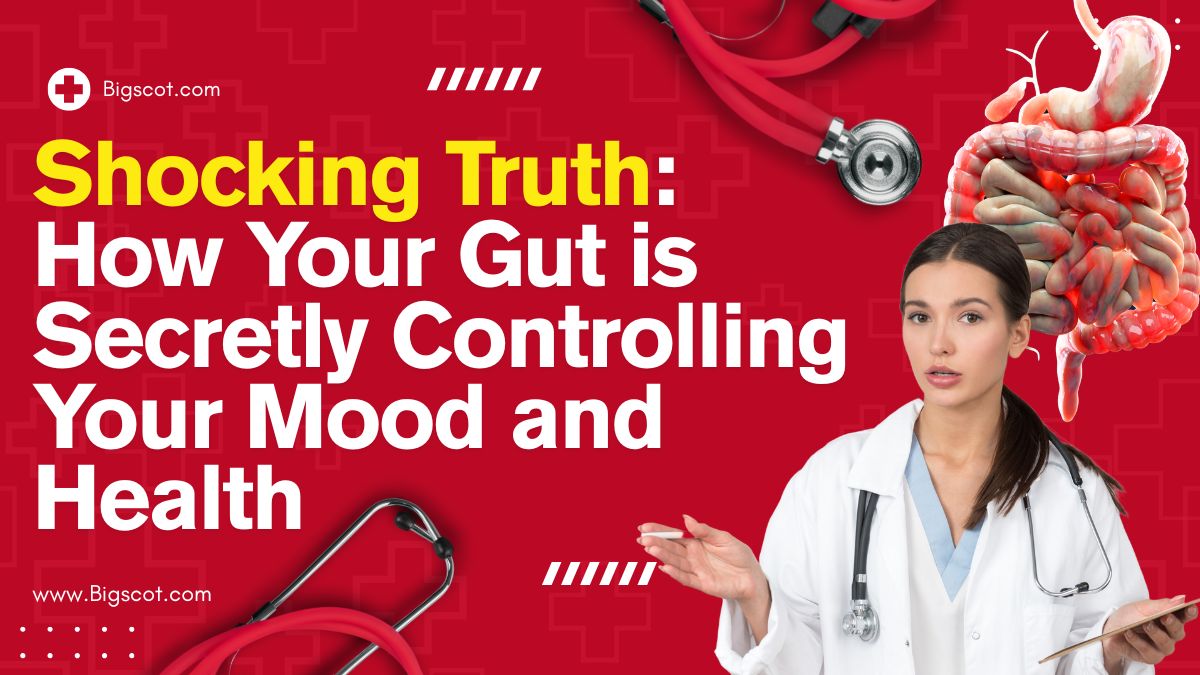Your Second Brain: The Gut-Brain Connection Doctors Rarely Talk About
Did you know your gut has its own nervous system called the Enteric Nervous System (ENS), often referred to as the “second brain“? It has over 100 million neurons — more than the spinal cord! What’s more surprising is how it directly influences your mental health, immune system, and even the decisions you make daily.
Many doctors treat symptoms — but few dive into the gut’s role as the root cause.
Hidden Truths the Medical Industry Rarely Emphasizes
Gut Secrets Even Some Doctors Don’t Fully Reveal:
- Over 90% of serotonin (the “happy hormone”) is produced in the gut — not the brain!
- Long-term use of antibiotics can destroy gut flora and lead to depression, brain fog, and anxiety.
- Sugar doesn’t just hurt your teeth or weight — it feeds bad gut bacteria and fuels inflammation.
- Most multivitamins and supplements don’t even get absorbed properly if your gut lining is inflamed.
- Chronic bloating, fatigue, or acne? It could be leaky gut syndrome — often overlooked or misdiagnosed.
- 70% of your immune system lives in your gut — yet most treatments ignore this and focus on external meds.
Table: Brain vs Gut – Who’s Really in Control?
| Function | Brain (CNS) | Gut (ENS) |
|---|---|---|
| Neurons | ~86 billion | ~100 million |
| Serotonin Production | ~5-10% | ~90-95% (gut produces most) |
| Direct Mood Impact | ✅ Yes | ✅ Yes (via gut-brain axis) |
| Independent Reflex Actions | ❌ Needs brain input | ✅ Acts independently |
| Impact on Immunity | ⚠️ Some | ✅ Major regulator |
Real-Life Scenarios You Didn’t Know Were Gut-Related
Ever felt that sudden afternoon energy crash, even after a decent meal? It might not be your diet — it could be gut dysbiosis, a hidden imbalance in your gut bacteria. Those irritable mood swings before meals? That’s often your gut signaling a neurotransmitter disruption, not just hunger. And if you feel exhausted after eating, it’s a red flag — pointing to slow gut motility or low-grade inflammation silently draining your energy. These everyday symptoms aren’t random — they’re your gut’s way of crying out for help.
- That unexplained afternoon crash? It may be gut dysbiosis, not your diet.
- Mood swings before meals? Could be an imbalance of gut bacteria affecting neurotransmitters.
- Always tired after eating? Possible sign of slow gut motility or inflammation.
What Doctors Might Not Tell You (But You Should Know)
“Take this for your anxiety” may actually mask a deeper gut imbalance.
Instead of jumping to pills:
- Ask for a stool microbiome test (very few GPs offer this proactively).
- Start a 30-day gut reset with fermented foods, bone broth, and fiber.
- Ditch artificial sweeteners — they kill beneficial bacteria silently.
Gut-Healing Checklist (Start Today!)
Imagine waking up each day feeling clear-headed, energetic, and emotionally balanced — all because you finally gave your gut the attention it deserves. Start with probiotic-rich foods like kimchi, sauerkraut, or kefir — these are live cultures that flood your gut with friendly bacteria. Say goodbye to ultra-processed junk and refined sugars, which silently poison your gut and inflame your body from within. Embrace intermittent fasting — not as a diet, but as a deep detox that gives your digestive system time to heal and reset. Feed your microbes the food they love: prebiotics found in garlic, onions, and bananas. Start questioning every pill you pop — many medications harm your gut more than help unless absolutely necessary. Your gut repairs itself while you sleep, so aim for 7 to 8 hours of deep, restful sleep each night. And perhaps the simplest yet most underestimated habit: drink enough water and chew your food slowly — because digestion begins in the mouth, not the stomach. Every small step you take is a message to your body: I choose healing. I choose strength. I choose me.
- Eat probiotic-rich foods (kimchi, sauerkraut, kefir)
- Avoid ultra-processed junk food and sugars
- Try intermittent fasting to give your gut a break
- Include prebiotics like onions, garlic, bananas
- Cut back on unnecessary medications
- Sleep 7–8 hours — your gut repairs during sleep
- Stay hydrated and chew your food slowly
Final Thought: The Gut Is the Silent Ruler
Modern medicine often isolates the body into pieces. But your gut connects everything — your brain, hormones, mood, immunity, and even skin health.
It’s not just “you are what you eat.”
It’s “You are what your gut can digest, absorb, and heal.”

